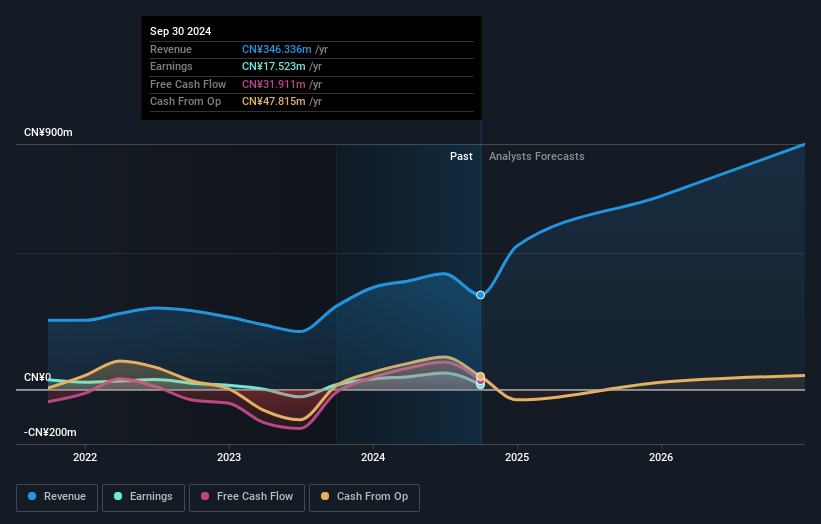- China
- /
- Electronic Equipment and Components
- /
- SZSE:300902
After the recent decline, Guoanda Co., Ltd. (SZSE:300902) CEO Weiyi Hong's holdings have lost 14% of their value

Key Insights
- Significant insider control over Guoanda implies vested interests in company growth
- The top 2 shareholders own 51% of the company
- Ownership research, combined with past performance data can help provide a good understanding of opportunities in a stock
A look at the shareholders of Guoanda Co., Ltd. (SZSE:300902) can tell us which group is most powerful. The group holding the most number of shares in the company, around 58% to be precise, is individual insiders. That is, the group stands to benefit the most if the stock rises (or lose the most if there is a downturn).
As market cap fell to CN¥3.9b last week, insiders would have faced the highest losses than any other shareholder groups of the company.
Let's take a closer look to see what the different types of shareholders can tell us about Guoanda.
Check out our latest analysis for Guoanda

What Does The Institutional Ownership Tell Us About Guoanda?
Many institutions measure their performance against an index that approximates the local market. So they usually pay more attention to companies that are included in major indices.
Institutions have a very small stake in Guoanda. That indicates that the company is on the radar of some funds, but it isn't particularly popular with professional investors at the moment. So if the company itself can improve over time, we may well see more institutional buyers in the future. We sometimes see a rising share price when a few big institutions want to buy a certain stock at the same time. The history of earnings and revenue, which you can see below, could be helpful in considering if more institutional investors will want the stock. Of course, there are plenty of other factors to consider, too.

We note that hedge funds don't have a meaningful investment in Guoanda. The company's CEO Weiyi Hong is the largest shareholder with 47% of shares outstanding. Qingquan Hong is the second largest shareholder owning 4.0% of common stock, and Fengchai Lin holds about 3.5% of the company stock. Interestingly, the second and third-largest shareholders also happen to be the Secretary and Member of the Board of Directors, respectively. This once again signifies considerable insider ownership amongst the company's top shareholders.
After doing some more digging, we found that the top 2 shareholders collectively control more than half of the company's shares, implying that they have considerable power to influence the company's decisions.
While studying institutional ownership for a company can add value to your research, it is also a good practice to research analyst recommendations to get a deeper understand of a stock's expected performance. While there is some analyst coverage, the company is probably not widely covered. So it could gain more attention, down the track.
Insider Ownership Of Guoanda
The definition of an insider can differ slightly between different countries, but members of the board of directors always count. Company management run the business, but the CEO will answer to the board, even if he or she is a member of it.
Most consider insider ownership a positive because it can indicate the board is well aligned with other shareholders. However, on some occasions too much power is concentrated within this group.
It seems that insiders own more than half the Guoanda Co., Ltd. stock. This gives them a lot of power. That means they own CN¥2.2b worth of shares in the CN¥3.9b company. That's quite meaningful. Most would be pleased to see the board is investing alongside them. You may wish todiscover (for free) if they have been buying or selling.
General Public Ownership
The general public-- including retail investors -- own 40% stake in the company, and hence can't easily be ignored. While this group can't necessarily call the shots, it can certainly have a real influence on how the company is run.
Next Steps:
I find it very interesting to look at who exactly owns a company. But to truly gain insight, we need to consider other information, too. For instance, we've identified 3 warning signs for Guoanda (2 are a bit unpleasant) that you should be aware of.
If you are like me, you may want to think about whether this company will grow or shrink. Luckily, you can check this free report showing analyst forecasts for its future.
NB: Figures in this article are calculated using data from the last twelve months, which refer to the 12-month period ending on the last date of the month the financial statement is dated. This may not be consistent with full year annual report figures.
New: Manage All Your Stock Portfolios in One Place
We've created the ultimate portfolio companion for stock investors, and it's free.
• Connect an unlimited number of Portfolios and see your total in one currency
• Be alerted to new Warning Signs or Risks via email or mobile
• Track the Fair Value of your stocks
Have feedback on this article? Concerned about the content? Get in touch with us directly. Alternatively, email editorial-team (at) simplywallst.com.
This article by Simply Wall St is general in nature. We provide commentary based on historical data and analyst forecasts only using an unbiased methodology and our articles are not intended to be financial advice. It does not constitute a recommendation to buy or sell any stock, and does not take account of your objectives, or your financial situation. We aim to bring you long-term focused analysis driven by fundamental data. Note that our analysis may not factor in the latest price-sensitive company announcements or qualitative material. Simply Wall St has no position in any stocks mentioned.
About SZSE:300902
Guoanda
Engages in the research, development, production, and sale of automatic fire extinguishing devices and systems in China.
Excellent balance sheet low.


